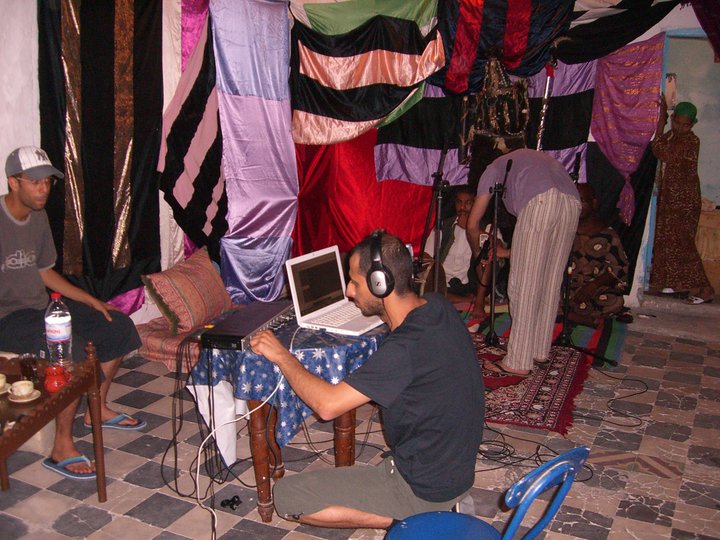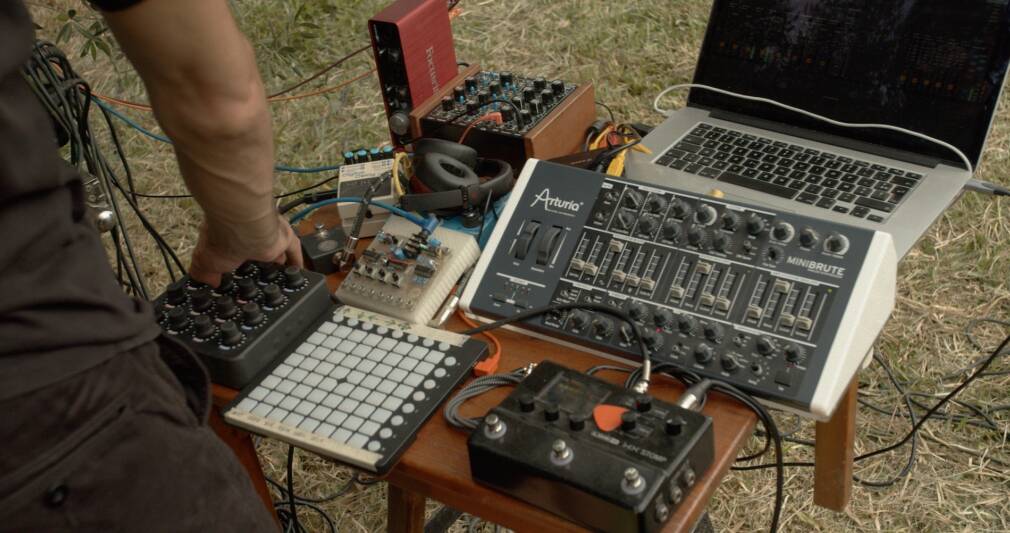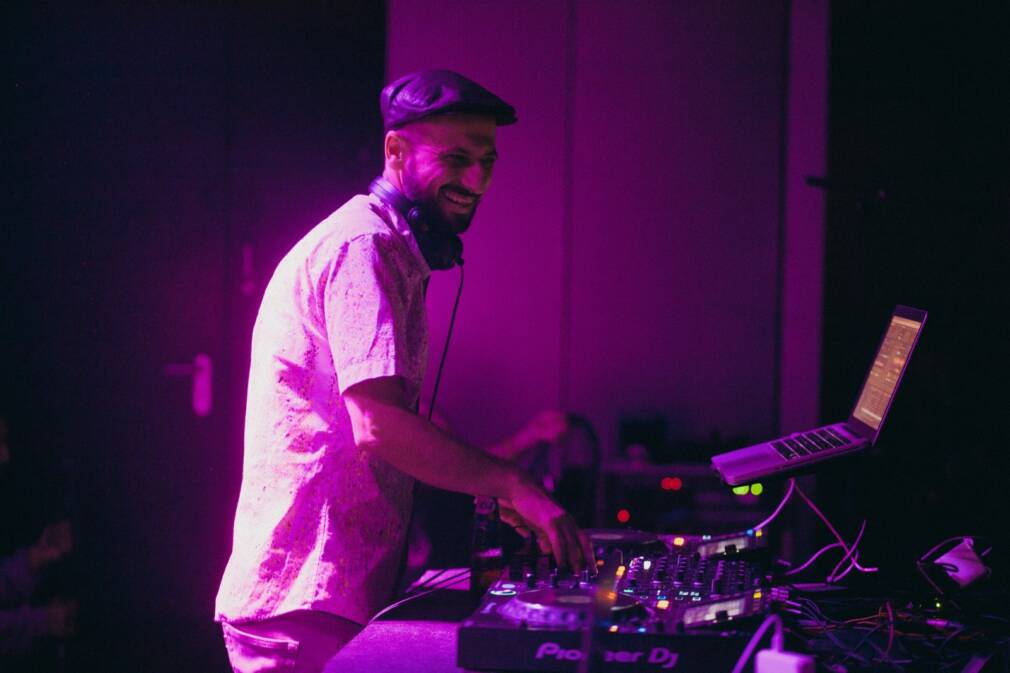It seems that May will be a month of elevation. That’s a good thing. At Pan African Music and Shouka Records, we like elevation. And trance, too. Especially ones inspired by therapeutic music and possession rituals. Yes, with our partners, we worked hand in hand, like possessed people. Starting with the release of the documentary Stambeli, the spirits’ last dance, directed by Augustin le Gall and yours truly, co-produced with ApA.
Filmed between the sanctuary of Sidi Ali El Mekki on the Mediterranean coast and the heart of the medina of Tunis, this film, in three episodes, explores Stambeli, a cult threatened with extinction, through the perspective of three protagonists: the young master of ceremony Lotfi Karnef, Riadh Ezzawech, one of the last mediums of Tunisia, as well as Amine Metani, a musician and leader of the label, Shouka.
The documentary will be screened for the first time at Nuits Sonores, punctuated by hypnotic interludes, played live by Amine Metania, aka Mettani. He is also the one who composed the soundtrack of the final episode of the series.
Amine is the co-founder of the label Shouka Records, based in Lyon and specialized in uplifting music, electronic trance and cultural (re)appropriation. And this year, for Nuits Sonores 20th anniversary, the artists and supporters of the label will be in the front rows of the Lyon program. Frigya (Imed Alibi & Khalil Epi), Nessym (Nessim Zghidi), the best kept secret of the label, Flore, producer at the helm of POLAAR, Glitter55 and Deena Abdelwahed will all play in Lyon. Each artist either a defector or member of the Tunisian-French nebula Shouka and brought together by a generous love for bass music and electronic trance.
It will only be missing Ammar808 to complete this unstoppable musical and cultural mesh. But he will be there in spirit, since he has just announced via Shouka a four track project dedicated to the famous ritual of animist possession, Super Stambeli.
Shouka, treasure and heritage
“Everything started in 2010 with Stambeli” remembers Nessym, co-founder of the label. “I was a student in electroacoustic composition under the aegis of Bernard Fort, who has produced, among others, a very large number of records and recordings. Passionate about field recording, Amine Metani and I went to record two Stambeli ceremonies. It was more than a dozen years ago, in the sanctuary of Sidi Ali El Mekki and in Bab Souika. In a hyper naïve way, as an amateur,” specifies the Tunisian musician. “It was a musical, aesthetic, and identity shock. Especially as a child, when I lived in Tunisia, I remember that I was very afraid of the Stambeli processions when I saw them. Their masks scared me. If we set up a label, it was in order to archive, edit and distribute these sonic testimonies. Because we already felt their fragility and their possible disappearance,” explains Nessym.

The genesis of Shouka is linked to these sounds, but coupled with a second reference, European electronic music. “When Mettani (the stage name of Amine Metani, NDLR) and I were still living in Tunisia in the 2000s, we were evolving in a very Westernized microcosm, under the influence of the English scene. We were tripping on Prodigy and the Chemical Brothers. But we were already having fun sampling gasba (reed flute, NDLR), mixed with big electronic beats. We felt a bit lonely, and I think Shouka was born from this singularity. From our desires for modernity, chained with our Tunisian, Arab and African backgrounds. Nuri, Ghoula, Deena Abdelwahed or Arabstazy are all artists of the label who recognize themselves in these plural identities. Shouka is our base to send our sounds of the future, directly from both worlds. With a big part of our DNA coming from the Stambeli.“
Return to the source
So it was only logical that from this base came Super Stambeli, the first release from the illustrious Ammar 808 at Shouka. After shaking up the entire global bass scene in 2018 with Maghreb United, and then boxing up Global Control / Invisible Invasion, in Chennai, South India, producer Sofyann Ben Youssef – armed with his subsonic Ammar 808 project – has just delivered to the label his own personal take on the Stambeli ritual. “My first encounter with Stambeli was twenty years ago, more or less,” Ammar 808 told us. “I found myself in a zaouia (a sacred house dedicated to the Stambeli brotherhood, editor’s note), in Tunis. It was a real blackout, a spiritual slap. This event put me on the way to discovering this mystical practice, of which I knew nothing at the time. I accumulated, accumulated, accumulated… Reflection, musical practice as well, since I have been playing the gombri (bass lute with three plucked strings, editor’s note) for twenty years. I also mastered a good part of the repertoire. It can sometimes take time for an artist to reach the critical point. For me, it was time.“
Sofyann then left his studio in the suburbs of Copenhagen to look for a mâllem in Tunis. Also called yenna, this master of ceremony is at the center of the orchestra. His instrument – the gombri – governs the ritual: “Each yenna, each mâllem has a musical color, a specific hue. They differ by their voice, their way of playing. In my quest, I found Belhassen Mihoub who I used to play with at the time.”

Belhassen is the mâllem of Dar Barnou in Tunis, the headquarters of one of the last Stambali brotherhoods in the country. You can discover this figure of the cult in episode III of our documentary, Stambeli, the spirits’ last dance: “Belhassen’s mark is his versatility,” explains Ammar 808 “He has an openness that allows him to adapt to less traditional contexts, compared to other Tunisian mâllems. Belhassen comes from the tradition, he is the guardian of a heritage, but he knows how to bring modernity into the ritual. One foot in the sacred, the other in the profane. Perhaps one of the forms of survival of Stambeli lies in its hybridization, musical in any case. Especially since all rituals are at the service of humanity. Some knowledge can skip generations and reappear again, carried by willful energies.“
Like the many energies present at Shouka records. “I like the strange alignment of planets that appeared so that Super Stambeli could be released on the label of Amine, Nessym and Khalil Epi. I love this attempt to digitize, to amplify the ritual with thousands of watts!“
“This takeover of the label at Nuits Sonores will allow us to deploy all the richness of the label in front of the public,” adds Khalil Epi, the other half of the Frigya and active member of Shouka. “A richness that draws its source from the Tunisian identity, its musical heritage, sometimes unseen, and our appetite for the energy of the club.




